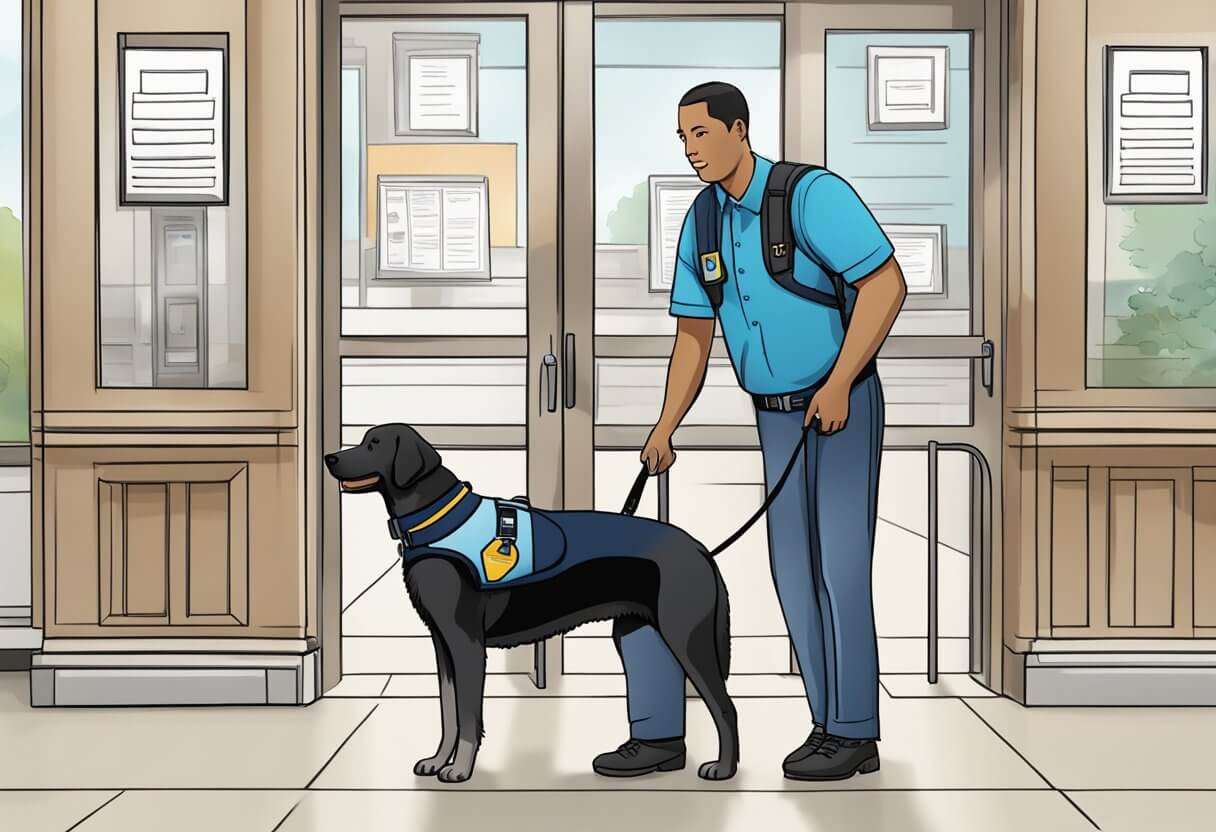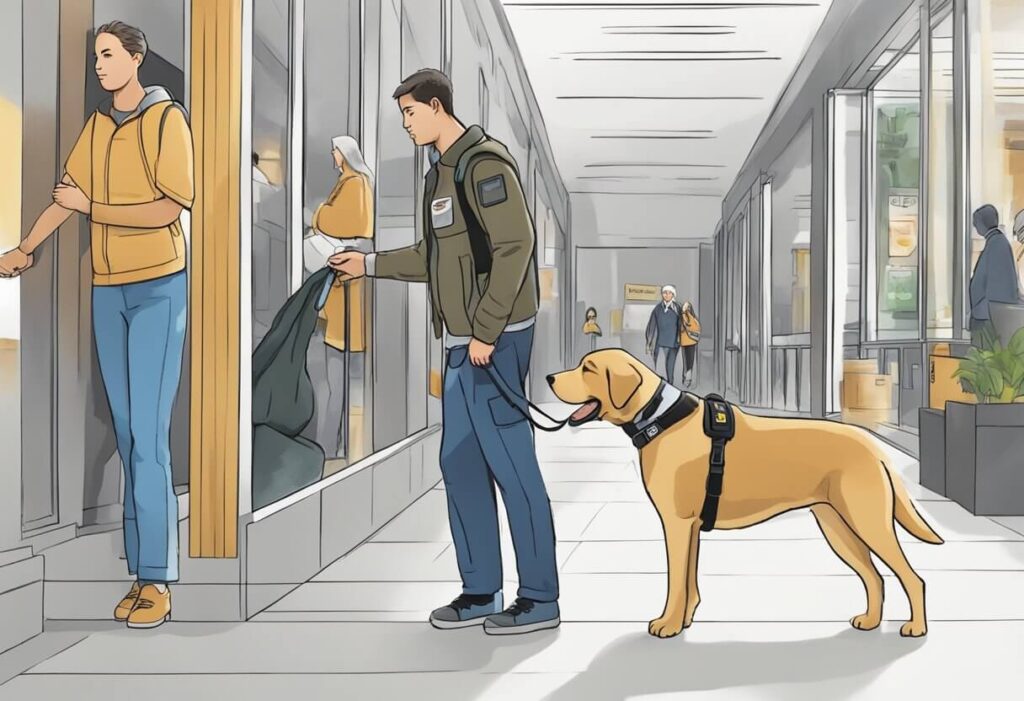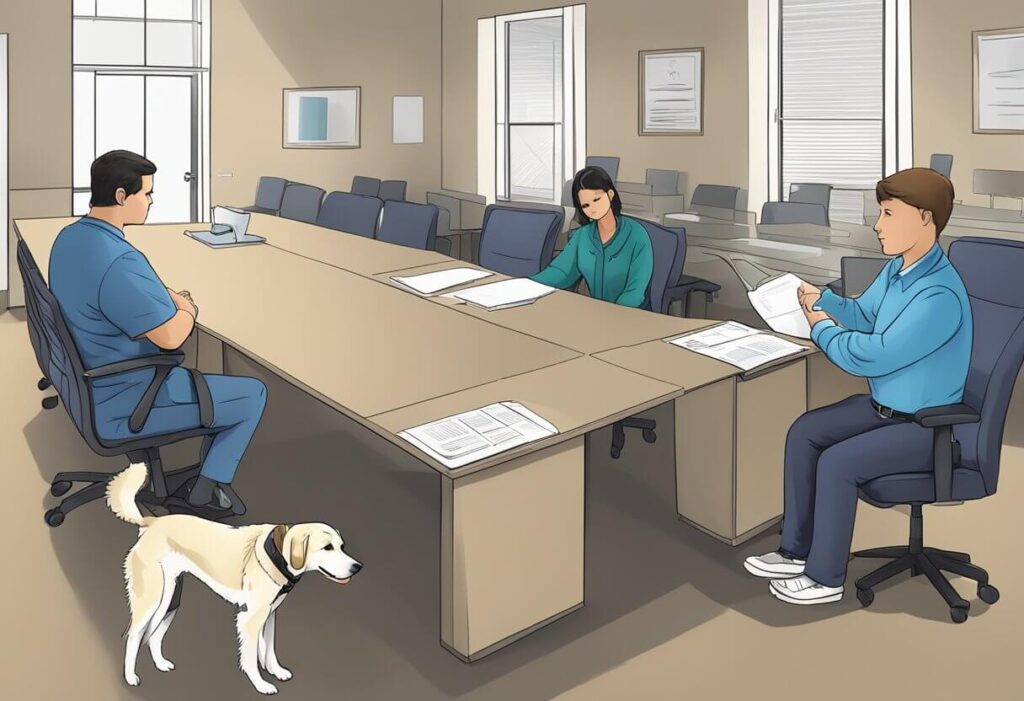Can You Legally Ask for Proof of a Service Dog?

Service dogs provide critical assistance to those with disabilities. But conflicts sometimes arise when businesses ask intrusive questions or request certification. What are the laws regarding proof and documentation for a service animal?
The short answer: No, you cannot legally ask for proof of a service dog. The Americans with Disabilities Act (ADA) protects the rights of people with disabilities to bring their service dogs into public places without having to show formal identification, certification, registration or documentation.
This in-depth guide covers key questions around laws protecting service dogs and what business owners need to know. We’ll explore:
- What is a service dog under the ADA
- Certification and ID requirements
- What questions can legally be asked
- When access can be refused
- Hotel and accommodation laws
- Fees and charges
- Service dog owner rights
- Differences from emotional support animals
- Psychiatric service dog specifics
- Service dog training
- Laws protecting service dogs
What is a Service Dog Under the ADA?
The ADA provides federal protections to people with disabilities, allowing them to bring their service animals into the same public spaces as others. Legally, a service dog is defined by the ADA as a dog (of any breed, size or age) individually trained to perform disability-related tasks for someone with a physical or mental condition.
Service dogs receive extensive specialized training to help people manage a range of difficulties related to mobility, health, sensory processing, psychiatric issues, and more. For example, they can guide the blind, alert the deaf, pull wheelchairs, remind people to take medication, or interrupt harmful behaviors. The dog’s training directly mitigates aspects of a person’s disability.
It’s important to note that emotional support animals (ESAs) are not the same as service animals under the ADA. ESAs provide comfort and reassurance, but are not necessarily trained in specific supportive tasks. Often ESAs are mistaken for service dogs. More on this later.
Are Service Dogs Required to Have Certification or ID?

This is a common area of confusion. The ADA does not require service dogs to be formally certified, registered or licensed. You cannot ask for “papers” for a service dog as a condition for entry. They also do not have to wear identification vests or tags noting their status. Their extensive training is what gives them the designation as service animals.
However, many service dog owners do choose to outfit their dogs with vests, badges and certification indicating their legitimacy. This can help avoid unwanted attention and questioning. It also alerts the public that the dog is working and should not be disturbed. But under the law, identification and certification are not mandatory. The dog’s training is what matters when designating it as a service dog.
What Questions Can You Ask About a Service Dog?
When it comes to asking questions about a service dog, business owners and staff are legally only allowed to ask two things:
- Is the dog a service animal required because of a disability?
- What work or task has the dog been trained to perform?
They cannot ask about the details of the owner’s specific diagnosis or medical records. Per the ADA’s guidelines, additional probing is considered overreach and invasion of privacy for the disabled individual.
If the person’s disability is clearly visible (e.g. blindness with use of guide dog), then staff may not be permitted to ask anything. But in cases where need for a service dog is less apparent, those two questions can legally be posed to confirm the dog’s purpose.
When Can a Business Refuse Access to a Service Dog?
There are only a few scenarios where a public business establishment can deny entry to service dogs:
- The dog is out of control and the owner does not take appropriate action
- Allowing the service dog would fundamentally change the nature of services offered (e.g. food sanitation standards, medical equipment settings)
So for example, a restaurant could potentially refuse seating if someone’s service dog is barking repeatedly, jumping on tables or threatening other patrons. They are not required to tolerate highly disruptive behavior that infringes upon normal operations.
However, dislike, fear or even cultural or religious aversions to dogs do not constitute valid reasons for denying access to trained service animals that are under control. Those are considered discriminatory responses.
Do Hotels Have to Allow Service Dogs?
Yes – hotels, motels and other lodging establishments must modify their no pet policies to welcome disability service dogs. Per the ADA’s guarantees of equal accommodation:
- The hotel cannot refuse to rent a room to someone just because they use a service dog
- They cannot charge a cleaning fee or additional security deposit due to the presence of the service animal
However, they can still charge if the guest’s dog causes any damage beyond regular wear and tear from a stay. And as with any public space, they can request that both owner and service dog leave if there are disturbances, aggressive behavior, or decline of sanitary conditions related to the animal.
Can You Be Charged Fees for a Service Dog?
No, the ADA prohibits any extra charges or fees for accommodating a legitimate service dog.
Hotel guests with service dogs cannot be charged for:
- Pet cleaning fees
- Additional room rentals because the dog needs space
- Refundable cleaning deposits
And in public venues like restaurants, stores, taxis and theaters, service dog handlers cannot be asked to pay any admittance or booking costs that others without dogs would not incur. Doing so qualifies as discrimination under the ADA.
What Should Service Dog Owners Know About Their Rights?

Having a well-trained disability service dog that aids daily functioning confers certain legal rights and protections. Service dog users should be aware of the following when navigating public life:
Rights in Public Areas & Businesses
The ADA guarantees people with disabilities the right to bring service animals into any area open to the general public. Hotels, transportation services, stores, theaters, parks etc. must allow service dog admittance.
Access Rights on Flights
Per the Air Carrier Access Act (ACAA), airlines must permit service dogs to travel with disabled owners within the cabin, without extra fees.
Housing Rights
The Fair Housing Act protects users of service animals from discrimination when seeking housing. Landlords and homeowner associations must provide reasonable accommodation for tenants with guide, assistance or therapy dogs.
Protection from Documentation Requests
As noted, the ADA prohibits demanding certification papers, special ID or documentation for the owner’s disability or need for a service dog. Training legitimizes the animal.
In essence, those using service dogs for mobility assistance, seizure alerts, psychiatric intervention and more have federally protected rights to live life freely while accompanied by their specially-trained dogs.
What is the Difference Between Service Dogs and ESAs?
There is some confusion over the distinction between psychiatric service dogs (PSDs), emotional support animals (ESAs) and service dogs for physical disabilities. Let’s clarify:
Emotional Support Animals main scope is providing comfort through companionship and affection. They do not have special task training. ESAs are meant solely for emotional soothing versus medical/psychiatric intervention.
Psychiatric Service Dogs are trained in very specific responses and life-assisting tasks tailored to a handler’s psychiatric disability like PTSD, severe anxiety, panic disorder, depression, bipolar disorders, and more. They learn skills like triggering to ward off anxiety attacks, providing tactile stimulation to interrupt repetitive behaviors, reminding people to take medication, guiding disoriented individuals, etc.
So in short:
- Emotional support animals = Comfort
- Psychiatric service dogs = Supporting mental health through training in disability-related tasks
Additionally, laws differentiate ESAs from service dogs:
- Emotional support animals may have limited public access rights and no automatic access to restaurants, stores or planes
- Psychiatric service dogs and other disability service dogs have full public access rights due to ADA compliance
This key training and legal differentiation means psychiatric service dogs require the same treatment and access considerations from businesses as guide dogs, hearing assistance dogs, seizure alert canines, and more.
How are Psychiatric Service Dogs Different?
Psychiatric service dogs assist people managing severe mental health disabilities. Their precise tailored training enables them to help handlers in unique ways, like:
- Alerting someone to take prescribed medications
- Providing tactile stimulation to disrupt repetitive or self-harming behaviors
- Guiding disoriented individuals and preventing wandering
- Alerting handlers to escalating anxiety, panic or rage
- Warding off hallucinations or flashbacks
- Calming people coping with PTSD
- Positioning themselves to allow personal space in crowds
A psychiatric service dog repeatedly rehearses these disability-mitigating acts until they are second nature responses to the handler’s needs. The skills psychiatric service dogs acquire can be essential lifelines – helping people regain stability, functionality and independence.
What Kind of Training Do Service Dogs Receive?
All service dogs, including those specialized for certain psychiatric disorders, undergo extensive skill-building with professional handlers to address the wide array of tasks they must perform. This generally takes place over 18-24 months in dedicated training academies or individually with experienced private trainers.
Service dogs like guide dogs for the blind learn to confidently navigate all types of environments and avoid dangerous situations. Hearing assistance dogs learn to recognize important sounds like alarms and respond with clear signals to alert their deaf handlers.
Seizure alert and response dogs undergo understanding seizure stages and assisting people having attacks. And psychiatric service dogs receive dedicated training customized specifically to an individual to help them manage symptoms of PTSD, severe anxiety, depression, obsessive compulsive behaviors, panic disorders and more.
Skills training often involves basic obedience, disability simulation, desensitization, public access skills and specialized task reinforcement through both repetition and “scenario” practice. The extensive time, energy and consistency involved in crafting an adept service dog is what truly sets them apart from untrained pets or even emotional support animals.
What Laws Protect Service Dogs and Their Owners?

The Americans with Disabilities Act (ADA) is the primary piece of federal legislation guaranteeing people with disabilities equal rights and access when accompanied by their service dogs. Passed in 1990, the ADA makes it illegal for businesses, employers, states and local governments to discriminate against disabled individuals using guide, hearing, seizure alert and psychiatric dogs.
Specifically regarding service animals, the ADA’s protections ensure:
- People with disabilities can bring service dogs into any spaces open to the public
- Businesses and facilities cannot charge extra fees or deposits
- Owners cannot be compelled to provide certification papers or disability documentation
- Training legitimizes the animal as a service dog – no ID vest required
- Rights to travel on planes with service dogs
Additionally, the US Department of Justice oversees and enforces ADA regulations requiring reasonable accommodation of service dog users. The DOJ has clarified restrictions around documentation requests, access parameters and answering permitted questions.
So in essence, federal law protects the rights of individuals who rely on service animals for independence – granting them equal freedoms of public transportation, business access, air travel, housing, recreation, and more.
Conclusion
The ADA guarantees people’s rights to bring trained service dogs assisting with disabilities into public spaces without having to furnish formal proof of credentials. Business owners also have responsibilities within appropriate legal constraints regarding service dog admittance.
Knowing the laws around asking for proof, certification inquiries, admittance parameters and access rights ensures fair, inclusive and lawful treatment of patrons assisted by guide, hearing, seizure, psychiatric and all categories of disability service dogs.






